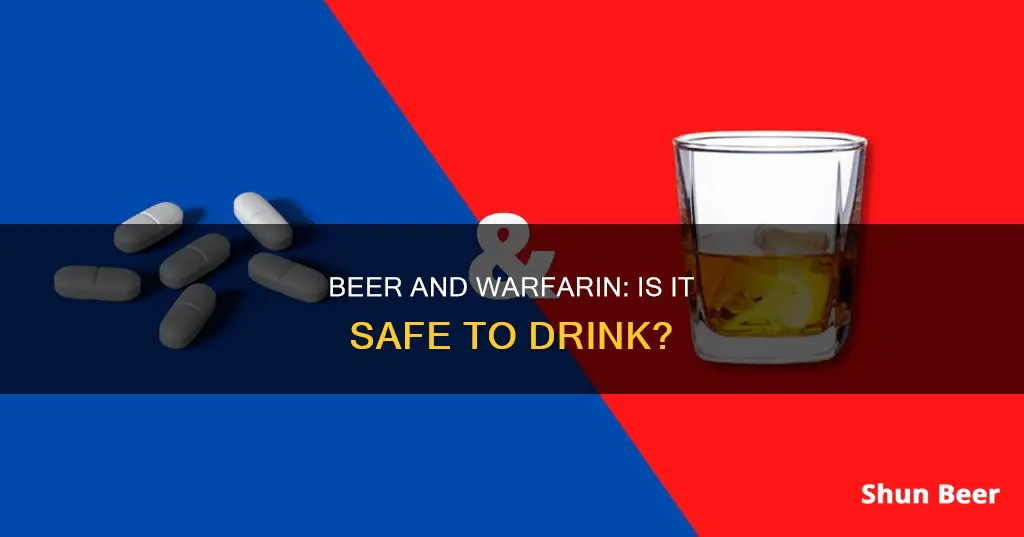
Drinking alcohol while on warfarin is not recommended by healthcare professionals due to the increased risk of bleeding. Warfarin is a commonly used blood thinner that can be affected by alcohol consumption, altering its impact on the body and increasing the likelihood of bleeding or a clot. While some sources suggest that moderate alcohol intake has little effect on the drug's response, others recommend abstinence. It is crucial to consult a doctor for individualised advice regarding alcohol consumption while taking warfarin.
What You'll Learn

Warfarin and alcohol can be a dangerous mix
Warfarin is a commonly used blood thinner that can help prevent and treat blood clots in the body. It is effective in reducing the risk of a stroke, heart attack, or other serious conditions. However, mixing warfarin with alcohol can have adverse effects and lead to serious health complications.
Alcohol can affect how warfarin works in the body. It slows down the breakdown of warfarin, leading to a buildup of the drug in the system. This buildup can enhance the effects of warfarin and increase the risk of major bleeding. Warfarin interferes with the blood clotting process, and when combined with alcohol, which also reduces the body's ability to form clots, the risk of bleeding is significantly increased.
The combination of warfarin and alcohol can be dangerous, especially for those with liver disease. Liver disease can further increase the buildup of warfarin in the body, exacerbating the potential side effects. Additionally, excessive alcohol consumption can negatively impact the effectiveness of warfarin, increasing the risk of blood clots, heart attacks, and strokes.
It is important to note that the effects of mixing warfarin and alcohol vary from person to person. Factors such as age, gender, medical history, and the amount and type of alcohol consumed all play a role in the overall impact. Therefore, it is crucial to consult with a doctor before consuming alcohol while taking warfarin. Some healthcare providers may recommend completely avoiding alcohol during warfarin treatment.
If you choose to consume alcohol while on warfarin, it is recommended to drink in moderation and only after consulting with your doctor. For men, this means no more than two drinks per day, and for women, no more than one drink per day. Binge drinking or frequent alcohol consumption should be avoided as it can lead to dangerous side effects and increase the risk of bleeding. It is also important to monitor for any signs of bleeding, such as easy bruising or prolonged bleeding from cuts. If you experience any unusual bleeding or other side effects, it is crucial to seek medical advice promptly.
Beer and Chemo: What's Safe to Drink?
You may want to see also

Alcohol may cause you to bleed more easily
Drinking large amounts of alcohol (binge drinking) in a short period of time can decrease the metabolism of oral anticoagulants like warfarin, increasing the risk of bleeding. On the other hand, excessive daily alcohol use can increase the metabolism of warfarin, reducing its effectiveness and increasing the risk of a clot, heart attack, or stroke.
If you are taking warfarin, it is recommended to avoid drinking large amounts of alcohol. Modest alcohol intake, such as 1 to 2 drinks occasionally, is generally considered to have little effect on warfarin response if you have normal liver function. However, it is important to note that some healthcare providers recommend against alcohol ingestion completely while taking warfarin.
If you choose to drink alcohol while taking warfarin, it is crucial to have this combination approved by your doctor first. It is also important to monitor for any signs of bleeding, such as easy bruising or bleeding from cuts that take longer than usual to stop. If you experience any unusual bleeding or bruising, prolonged bleeding from cuts, increased menstrual flow, bleeding gums when brushing your teeth, nosebleeds, or blood in your urine or stools, be sure to contact your doctor promptly.
Beer and Sobriety: Understanding Alcoholism and Your Drinking Habits
You may want to see also

Drinking guidelines for those on warfarin
Warfarin is a commonly used blood thinner, also known as an anticoagulant, that helps prevent and treat blood clots in the body. While on warfarin, it is important to be cautious about alcohol consumption as it can affect how the medication works. Here are some guidelines to follow if you are on warfarin and wish to consume alcohol:
Understand the Risks
Alcohol can slow down how quickly your body breaks down warfarin, leading to a buildup of the drug in your system. This effect is even more pronounced if you have liver disease. Additionally, alcohol can decrease your body's production of platelets, which are essential for the blood clotting process. As warfarin also interferes with clotting, drinking alcohol while taking warfarin increases your risk of major bleeding.
Moderation is Key
If you choose to drink alcohol while on warfarin, moderation is crucial. It is recommended to limit your consumption to one or two drinks occasionally, not exceeding two drinks per day for men or one drink per day for women. Binge drinking or daily alcohol consumption should be avoided as it can further increase the risk of bleeding and negatively impact your health.
Consult Your Doctor
Before consuming any alcohol, it is essential to consult your doctor or healthcare provider. They can advise you based on your individual medical history and risk factors. Be sure to inform your doctor if you drink frequently, consume large quantities, or have liver disease, as you may require a dose adjustment or additional monitoring. Some healthcare providers may recommend abstaining from alcohol completely while taking warfarin.
Monitor for Side Effects
When drinking alcohol while on warfarin, be vigilant for any signs of bleeding, such as easy bruising or cuts that bleed longer than usual. Other side effects to watch for include nausea, vomiting, blood in urine or stools, headache, dizziness, or weakness. If you experience any of these symptoms, contact your doctor promptly.
Maintain Consistency
It is recommended to drink the same amount of alcohol each day, avoiding significant variations in your consumption. This helps maintain a consistent level of warfarin in your system and reduces the risk of unexpected side effects. Consistency in your diet is also important, especially with Vitamin K-rich foods, as sudden changes can affect how well warfarin works.
In summary, while occasional and moderate alcohol consumption may be acceptable while on warfarin, it is crucial to understand the risks and follow the guidance of your healthcare provider. Always prioritise your health and well-being, and remember that individual recommendations may vary based on your specific circumstances.
Is It Safe to Drink Beer That's Two Days Old?
You may want to see also

How alcohol affects your DVT risk
Alcohol does affect your risk of deep vein thrombosis (DVT). In some cases, it can decrease your risk, but there are times when drinking can increase it. The effect of alcohol on your risk of DVT depends on many factors, including what you drink (beer, wine, or liquor) and how much you drink.
Heavy alcohol consumption can lead to a variety of medical and behavioural problems. Excessive alcohol use has been associated with an increased risk of cancer, with heavy use carrying the highest risk. Excessive alcohol consumption is also associated with hepatic injuries, including alcoholic fatty liver disease, alcoholic hepatitis, and cirrhosis. Binge drinking can lead to an increased risk and mortality from cardiovascular disease.
Alcohol consumption can influence coagulation, fibrinolysis, and platelet activities. Heavy alcohol consumption is associated with a higher procoagulant state and an impaired fibrinolytic potential, which can predispose individuals to thrombosis. Acute ingestion of a large dose of alcohol enhances thromboxane-mediated platelet activation, and hyperactivity is observed after acute alcohol consumption. Long-term alcohol use induces chronic liver disease, and liver dysfunction represents an overall decrease in liver synthetic function, including a balanced decrease in the synthesis of anticoagulant thrombotic factors.
However, some studies have shown that light to moderate alcohol consumption is associated with a reduced risk of multiple cardiovascular outcomes, including coronary heart disease, coronary heart disease mortality, and the incidence of stroke.
If you are taking warfarin, it is important to talk to your doctor about alcohol consumption, as it can affect how the drug works. Alcohol slows down how quickly your body breaks down warfarin, which can lead to a buildup of the drug in your body. This buildup can increase the effects of warfarin. Alcohol can also cause your body to make fewer platelets than normal, and as platelets are the cells that start the blood clotting process, this can increase your risk of major bleeding.
Beer and Blood Thinners: Is It Safe?
You may want to see also

What to do if you drink and take warfarin
If you drink alcohol while taking warfarin, it is important to be aware of the risks and take certain precautions to ensure your safety. Here's what you should do:
Firstly, consult your doctor or healthcare provider. Be open and honest about your alcohol consumption, including the frequency and quantity of your drinking. Your doctor can advise you on whether it is safe for you to drink at all while taking warfarin, and they may recommend a complete abstention from alcohol. They may also adjust your dosage or perform additional tests to monitor your prothrombin time (PT) or International Normalized Ratio (INR).
If your doctor advises that occasional, modest alcohol intake is acceptable, limit yourself to one or two drinks per day for men or one drink per day for women. Avoid binge drinking or drinking large quantities of alcohol, as this can lead to a buildup of warfarin in your body, increasing the risk of major bleeding.
Be vigilant for any signs or symptoms that may indicate a problem. Call your doctor immediately if you experience any unusual bleeding or bruising, prolonged bleeding from cuts, increased menstrual flow, bleeding gums when brushing your teeth, nosebleeds, blood in your urine or stools, black stools, headache, dizziness, weakness, nausea, or vomiting. These could be indicators of serious side effects from the interaction of alcohol and warfarin.
Additionally, maintain a consistent eating and drinking schedule as much as possible. Warfarin therapy can be influenced by individual factors such as age, gender, and medical history, so it is important to keep your lifestyle habits stable to minimise fluctuations in the drug's effects.
Finally, if you are planning a procedure or surgery, be sure to inform your doctor about your warfarin and alcohol use. You may need to stop taking warfarin before the procedure, but do not discontinue it without first consulting your healthcare provider. They will guide you on the appropriate course of action to ensure your safety during the procedure.
Beer and Ketosis: Is It Possible to Enjoy Both?
You may want to see also
Frequently asked questions
It is not recommended to drink beer or any alcohol while on warfarin, as it can cause a buildup of the drug in your body and increase the risk of major bleeding. If you do choose to drink, it is advised to have no more than 1-2 beers occasionally and get it approved by your doctor first.
Alcohol can slow down how quickly your body breaks down warfarin, leading to a buildup of the drug in your system. This can increase the effects of warfarin and the risk of bleeding. It is important to speak with your doctor before drinking any alcohol while taking warfarin.
If you choose to drink alcohol while taking warfarin, it is recommended to limit your intake to one or two servings occasionally. This means no more than 2 drinks per day for men or 1 drink per day for women. Binge drinking or daily alcohol consumption should be avoided.
Drinking alcohol while taking warfarin can increase your risk of major bleeding. It can also cause your body to make fewer platelets, which are necessary for blood clotting. Additionally, alcohol can alter the effects of warfarin and increase the risk of side effects such as dizziness or lightheadedness.
Non-alcoholic beer typically contains a very low amount of alcohol, so it may be safe to consume in moderation while on warfarin. However, it is always best to check with your doctor or healthcare provider before consuming any type of alcohol while taking this medication.







